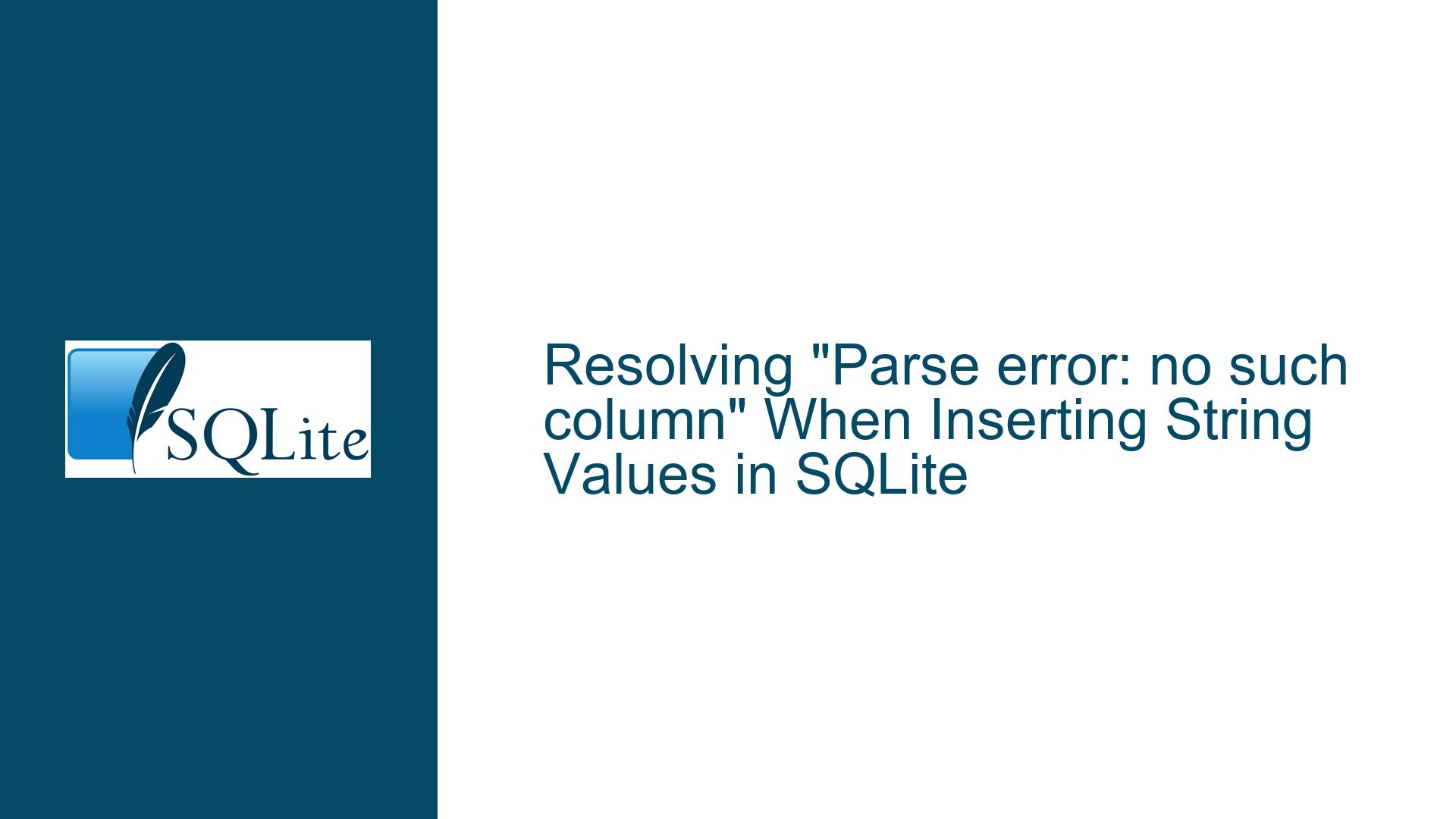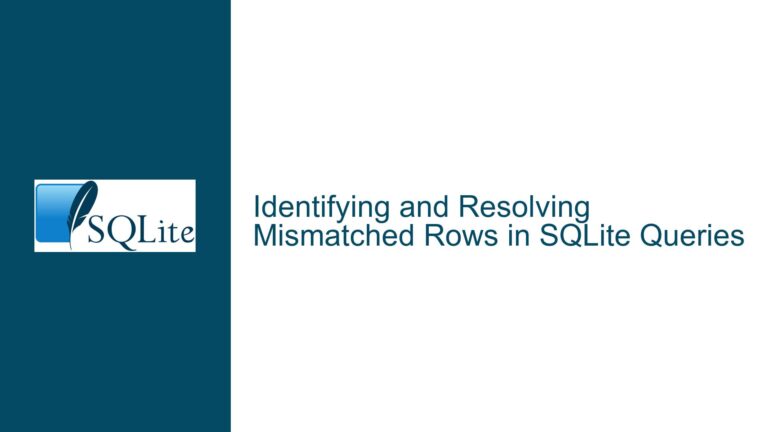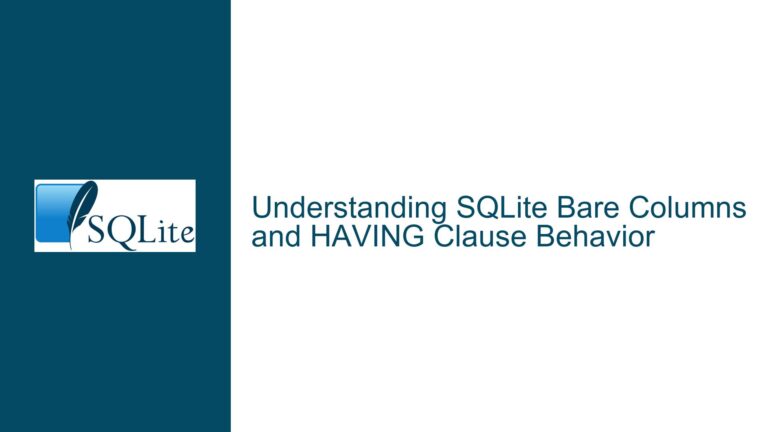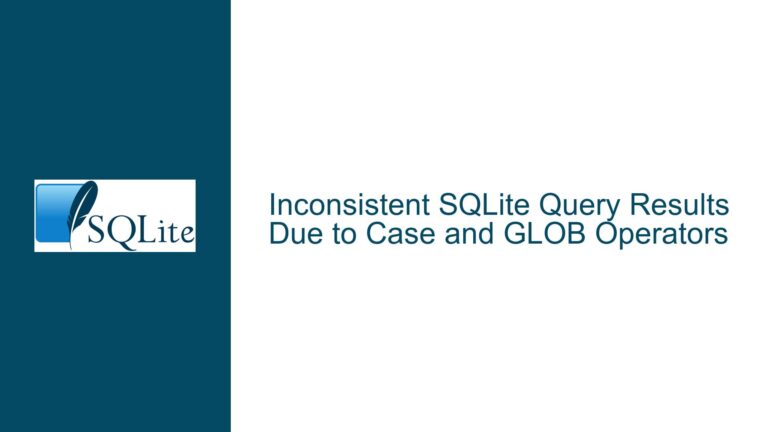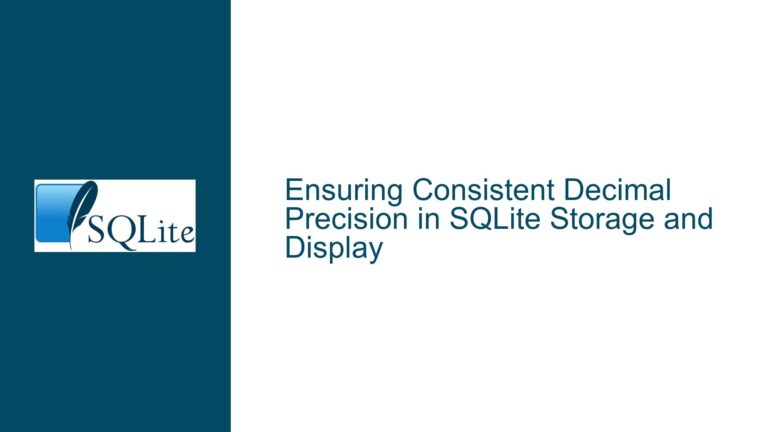Resolving “Parse error: no such column” When Inserting String Values in SQLite
Issue Overview: Misinterpretation of Double-Quoted Strings as Column Identifiers
The error Parse error near line X: no such column: Y occurs when SQLite’s parser encounters a double-quoted string ("Y") in a context where it expects a column name, table name, or other identifier. This is a direct result of SQLite’s strict enforcement of identifier vs. literal syntax rules, particularly in versions 3.29.0 and newer where the Double-Quoted String Literals (DQS) misfeature is disabled by default.
In the provided scenario, the INSERT statement uses double quotes around the string value "myproposal", which SQLite interprets as a reference to a column named myproposal. Since no such column exists in the proposals table, the parser throws an error. This behavior contrasts with older SQLite versions (pre-3.29.0), where double-quoted strings were often implicitly treated as string literals even in contexts expecting identifiers, masking syntax errors.
Key technical relationships at play:
- Identifier vs. Literal Syntax: SQLite follows the SQL standard where double quotes (
") delimit identifiers (e.g., column names with spaces:"column name"), while single quotes (') delimit string literals. Mixing these leads to misinterpretation. - DQS Configuration: The
SQLITE_DQScompile-time and runtime setting controls whether double-quoted strings are allowed as literals. Modern SQLite builds disable DQS by default, enforcing stricter parsing. - Schema Validation: The parser cross-references identifiers against the database schema during query preparation. Unrecognized identifiers trigger immediate errors, even if the query is syntactically valid.
This issue is exacerbated by subtle differences in SQLite builds across operating systems. For example, Alpine Linux’s SQLite package might enable stricter parsing flags compared to other distributions, exposing latent bugs in SQL scripts that previously "worked" due to lenient parsing.
Possible Causes: Incorrect String Delimiters and Configuration Settings
1. Double Quotes Used for String Literals
The immediate cause is the use of double quotes ("myproposal") instead of single quotes ('myproposal') to denote a string literal in the INSERT statement. SQLite interprets "myproposal" as an identifier due to the absence of DQS leniency, leading to a schema lookup failure.
2. SQLITE_DQS Disabled in Modern Builds
SQLite versions 3.29.0+ disable DQS by default. When DQS is disabled, the parser no longer allows double-quoted strings to be interpreted as literals in value contexts. This change exposes previously hidden syntax errors in legacy SQL code.
3. Inconsistent SQLite Build Configurations Across Environments
The error might manifest in one environment (e.g., Alpine Edge) but not another due to differences in how SQLite is compiled. For example:
- Alpine Linux’s package might compile SQLite with
-DSQLITE_DQS=0(DQS disabled). - Older systems or custom builds might use
-DSQLITE_DQS=3(DQS enabled), allowing double-quoted literals.
4. Legacy Code Written for Pre-3.29.0 SQLite Versions
Applications or scripts written against older SQLite versions might rely on DQS leniency, using double quotes for string literals. These break when upgraded to modern SQLite without adjusting the syntax.
Troubleshooting Steps, Solutions & Fixes: Correcting Syntax and Configuration
Step 1: Validate and Correct String Literal Delimiters
Replace all double quotes used for string literals with single quotes:
-- Incorrect (double quotes for literal)
INSERT INTO "proposals" VALUES(1, "myproposal");
-- Correct (single quotes for literal)
INSERT INTO "proposals" VALUES(1, 'myproposal');
Rationale: Single quotes unambiguously denote string literals, avoiding identifier parsing.
Step 2: Check SQLITE_DQS Settings in Your Environment
Determine whether DQS is enabled in your SQLite build:
PRAGMA compile_options;
Look for SQLITE_DQS in the output. If absent, DQS is disabled (default for 3.29.0+).
Workarounds:
- Recompile SQLite with DQS Enabled: Use
-DSQLITE_DQS=3during compilation (not recommended for new code). - Enable DQS at Runtime: Execute
PRAGMA dqs=1;before running legacy queries (temporary fix).
Step 3: Update Legacy Queries and Enable Strict Mode
Refactor all SQL scripts to use correct literals and identifiers. For large codebases, use a linter or regex replacement:
# Example: Replace double quotes with single quotes in INSERT statements
sed -i "s/INSERT INTO \".*\" VALUES(\(.*\),\"\(.*\)\");/INSERT INTO \"proposals\" VALUES(\1,'\2');/g" script.sql
Adopt Strict SQL Syntax Checking:
- Use
PRAGMA strict=ON;to enforce strict table schema adherence. - Enable the
SQLITE_STRICT_SUBTYPEcompile-time option to prevent type affinity issues.
Step 4: Verify SQLite Version and Build-Specific Behaviors
Identify your SQLite version and build configuration:
sqlite3 --version
sqlite3 :memory: 'PRAGMA compile_options;'
Cross-reference with known Alpine Linux packaging policies or consult distribution maintainers if the build configuration is unclear.
Step 5: Test Queries Across Target Environments
Run critical SQL scripts in all deployment environments (development, staging, production) to catch environment-specific parsing differences early.
Step 6: Educate Teams on SQLite’s Syntax Evolution
Highlight changes in SQLite’s parsing behavior across versions, emphasizing:
- The deprecation of DQS in modern practices.
- The importance of using ANSI SQL-standard string delimiters.
- Tools like
EXPLAINandEXPLAIN QUERY PLANto debug parser behavior.
Final Solution: Permanently Adopt Correct String Literal Practices
Enforce these standards in your organization:
- Literals: Always use single quotes.
- Identifiers: Use double quotes only for reserved keywords or spaces (e.g.,
"group"). - Avoid DQS Reliance: Treat DQS as a legacy compatibility feature, not a default.
By addressing the root cause—incorrect string delimiters—and aligning with SQLite’s modern parsing rules, the no such column error is fully resolved, ensuring forward compatibility and adherence to SQL standards.
